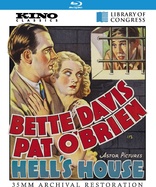Hell's House Blu-ray Movie
HomeHell's House Blu-ray Movie 
Kino Classics Remastered EditionKino Lorber | 1932 | 73 min | Not rated | Jun 18, 2013
Price
List price:Amazon: $14.99 (Save 50%)
Third party: $14.99 (Save 50%)
Only 1 left in stock (more on the way).
Movie rating
5.8 | / 10 |
Blu-ray rating
| Users | 2.0 | |
| Reviewer | 3.0 | |
| Overall | 2.8 |
Overview
Hell's House (1932)
Jimmy idolizes bootlegger Matt, and when he refuses to implicate his friend, he is sent to reform school. He befriends Shorty, a boy with a heart condition, and escapes to let the world know about the brutal conditions.
Starring: Bette Davis, Pat O'Brien (I), Junior Durkin, Emma Dunn, Charley GrapewinDirector: Howard Higgin
| Drama | 100% |
Specifications
Video
Video codec: MPEG-4 AVC
Video resolution: 1080p
Aspect ratio: 1.2:1
Original aspect ratio: 1.37:1
Audio
English: LPCM Mono
Subtitles
None
Discs
25GB Blu-ray Disc
Single disc (1 BD)
Playback
Region free
Review
Rating summary
| Movie | 3.0 | |
| Video | 3.5 | |
| Audio | 3.5 | |
| Extras | 0.5 | |
| Overall | 3.0 |
Hell's House Blu-ray Movie Review
"You will get out of this institution exactly what you put into it."
Reviewed by Casey Broadwater June 18, 2013Don't be misled by Bette Davis' top billing here; the starlet with the sultry eyes plays only an ancillary role in Hell's House, a low-budget boys reform school drama made in 1932, two years before Davis landed her breakout role as the cruel and manipulative Mildred Rogers in John Cromwell's adaptation of Somerset Maugham's Of Human Bondage. (Which Kino is also releasing this week.) A "poverty row" production shot on the cheap in just thirteen days, Hell's House is almost entirely unexceptional aside from Davis' brief presence. These sorts of social-ill/juvie-hall films were a dime a dozen in the 1930s—see the long- running Dead End Kids series—and Hell's House is one of the more routine, too tame to be a pre-Hays Code proto-exploitation flick and too timid to drive home a real message about the injustices of the type of reform school it depicts. (This is no Scum.) Upon its release, even moribund New York Times critic Mordaunt Hall called it "old-fashioned," which is to say, it's an early talkie with the narrative simplicity and bald sentimentality of an early silent picture. It's perhaps worth watching as a historical curiosity—so many of these movies are either lost or so obscure that no one cares to release them—but taken on its own merits, Hell's House is conventional and dry.
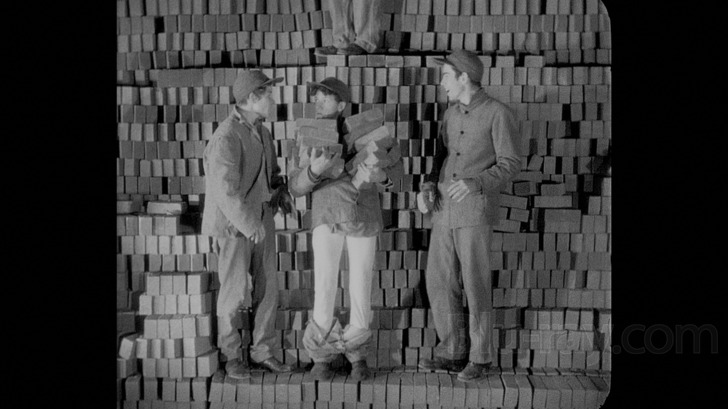
"Dry" is the appropriate word in another sense because Hell's House is set in the then-present day, at the tail-end of Prohibition, which figures largely in the plot. Child star Junior Durkin—who had recently been featured in Paramount's Tom Sawyer and Huckleberry Finn—plays the young Jimmy Mason, a golly-shucks, wet-behind-the-ears rural kid who is suddenly orphaned when his mother is struck and killed in a hit-and-run accident, setting up the film's key theme of taking responsibility for one's actions. (Incidentally, Durkin himself would die in a car crash only three years later, at 19.) With nowhere else to go, Jimmy heads to the big city, where his kindly uncle Harry (Charley Grapewin) and aunt Emma (Emma Dunn) take him in despite their limited income.
With the aging Harry out of work, what little money they are making comes from their boarder, Matt Kelly (Some Like It Hot's Pat O'Brien), a fast-talking fraud who claims to know all the local bigwigs. The impossibly naive Jimmy believes his name-dropping lies and takes a quick shine to Mr. Kelly, who is actually running an underground bootlegging operation. In need of a tight-lipped employee to keep watch over his storehouse, Mr. Kelly hires Jimmy—with strict orders not to tell anyone who might ask who's in charge—and inevitably, the cops bust in and arrest our book-smart but street-dumb pre-teen hero. Jimmy still somehow believes that Mr. Kelly is a standup guy, refusing to name him during an interrogation, and subsequently he's sent to the State Industrial School for Boys, where he holds on to the mistaken belief that his boss will come to straighten everything out. He's such a good kid that he even tells the officials that he's homeless so they won't bother his strapped-for-cash aunt and uncle.
From here, the film becomes a can he makes it on the inside tale of mild institutional injustice, with Jimmy experiencing all the ho-hum torments of what amounts to a cushy slave labor camp for wayward boys. He's given a number instead of a name. He's forced to work in a brickyard, where the older kids prank him, loading up his arms with bricks and then pulling his pants down. He's chosen as a "monitor" to make sure the other boys maintain absolute silence during a particularly low-key punishment. Considering its title, Hell's House is far from hellish, rendering a subplot about an appalled publisher/activist who wants to shut down the prison unbelievable. Another farfetched turn has Jimmy befriending a sickly kid named Shorty (Frank Coghlan Jr.), who's chucked into solitary confinement for writing a letter detailing all the abuses of the system. Apparently, Shorty's heart is so bad that putting him in a cell alone could kill him—he's fine with the heavy-duty brickwork, though—and so Jimmy mounts an escape and goes looking for help.
Where does Bette Davis fit in here? She plays Peggy Gardner, an unwitting gangster's moll who has no idea what her boyfriend, Mr. Kelly, does for a living. (Though she is suspicious.) Peggy takes pity on the orphaned Jimmy, and when he escapes, she aids in his attempt to rescue Shorty and bring the prison's issues to light. It's a small role, and though she has little to do, she is smart and sharp, using those expressive eyes to guilt trip Mr. Kelly into doing the right thing. Davis' presence is likely one of the only reasons Hell's House has survived and is still watched, unlike the scores of thematically similar movies that are either lost to time or devoid of lasting interest. If she were replaced here with some no-name b-movie actress who never achieved the fame Davis had after Of Human Bondage, I doubt Kino would've bothered to give Hell's House a proper Blu-ray release. Instead, you might find it in one of those 50 Movie Pack public domain collections you can pick up at Walmart for $10.
Hell's House Blu-ray Movie, Video Quality 
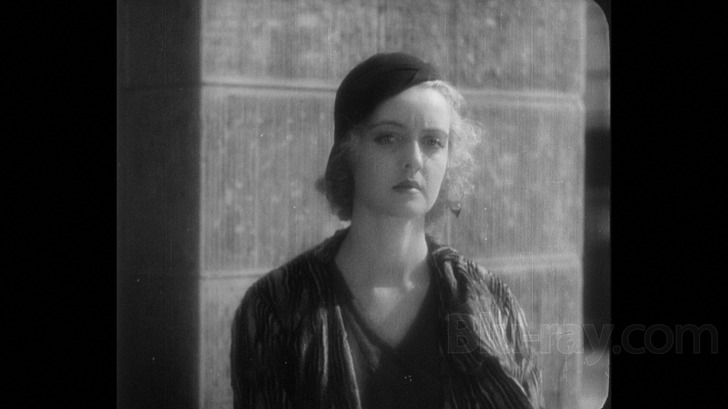
At the beginning of the film, you'll read this disclaimer:
"This archival edition of Hell's House was mastered in HD from an original 35mm print from Bette Davis' personal collection, donated to the
Library of Congress. The first reel is considerably worn, suffering nitrate decomposition and some missing frames. The film is otherwise intact."
And that about sums it up. The film's first few minutes suffer from strong print damage, with deterioration along the edges of the frame—resulting in a
sort of ghostly white, flickering vignetting—and a heavy flurry of white specks, overlayed with thick vertical and horizontal scratches. Additionally, there
are a few stutters and moments of choppiness due to the dropped frames, though these are fleeting. (There are no substantial chunks missing.) After
the first reel, the level of damage definitely lightens, but scratches and white flecks are still present to some degree throughout, along with other age-
related issues, like brightness fluctuations and small judders. Even at its worst, in those opening scenes, the damage is not in the least distracting,
especially if you're accustomed to watching films from this era. As with most Kino Classics releases, emphasis is placed on the true-to-source fidelity of
the picture. While the image hasn't undergone a frame-by-frame digital restoration, neither has it been artificially smoothed over with noise reduction or
other filtering methods. The film looks entirely natural, with a visible patina of grain and no signs of edge enhancement, compression artifacts, etc.
Clarity is often very impressive—you'll notice the fine detail in the boys' detention center uniforms, Bette Davis' individually visible eyelashes, etc.—and
the black and white contrast curve is balanced, with no overly crushed shadows or blown out highlights. A very watchable picture.
Hell's House Blu-ray Movie, Audio Quality 
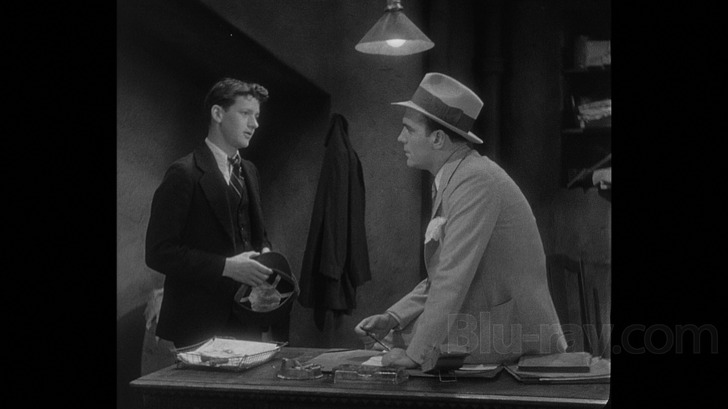
Like the picture, the film's uncompressed Linear PCM 2.0 mono track is also subject to some inevitable age damage, but never to a distracting extent. A light hiss runs through much of the movie, and you'll hear semi-frequent splice pops and crackles—along with a few outright dropouts from missing frames— but these are easy enough to ignore. What's most important is that the dialogue is relatively clear and easy to understand, with no major muffling or peaking. Likewise, the film's orchestral score sounds as good as can be expected for a film from this era, dynamically limited but bright and mostly clean. My only quibble here is that Kino—per custom—has once again neglected to include any subtitle options.
Hell's House Blu-ray Movie, Special Features and Extras 
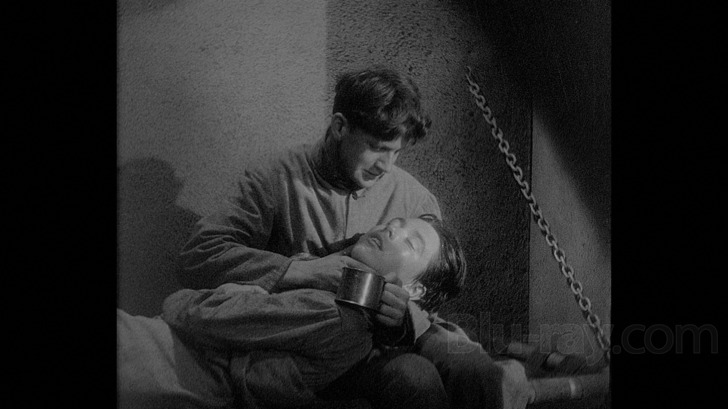
The only extra on the disc is a collection of high definition trailers for other Kino Classics releases.
Hell's House Blu-ray Movie, Overall Score and Recommendation 
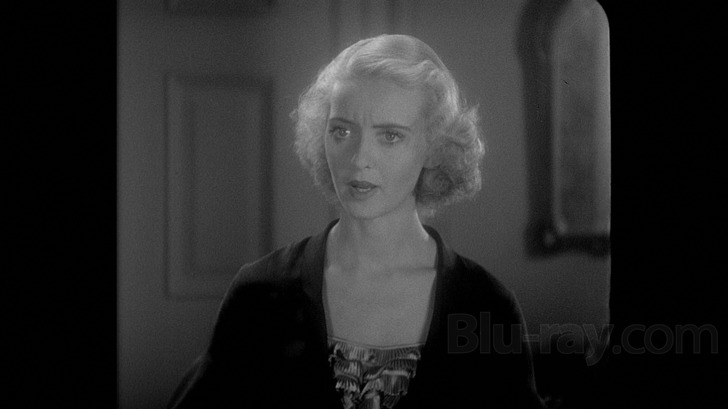
Headliner Bette Davis plays only a bit role in Hell's House, a routine boys reform school melodrama which really stars Junior Durkin, a child actor who tragically died two years later in a car accident. It's the archetypal rural hayseed kid gets in over his head in the big city story, and besides Davis' brief screen time, there's little here to differentiate Hell's House from the dozens of other juvenile delinquent films of the 1930s. Still, if you're a Bette Davis fan, she's reason enough to check watch the film, which arrives on Blu-ray courtesy of Kino with a high definition transfer sourced from a print that came from the big-eyed star's personal collection. For a film that features Davis more prominently, also check out Of Human Bondage, which Kino is also releasing this week.
Similar titles
Similar titles you might also like

Great Expectations
2011

Children of a Lesser God
1986

Jane Eyre
Limited Edition to 3000 - SOLD OUT
1943

Jane Eyre
2011

Fire with Fire
Captive Hearts
1986

The Children's Hour
1961

A Child Is Waiting
1963

Jolene
2008

Woman in Gold
2015

Instinct
1999

Rain
90th Anniversary
1932

Another Country
1984

Won't Back Down
2012

Sherrybaby
2006

Sparrows
1926

Finding Forrester
2000

Harum Scarum
Warner Archive Collection
1965

The Life Before Her Eyes
2008

Tanner Hall
2009

The Bells of St. Mary's
1945
